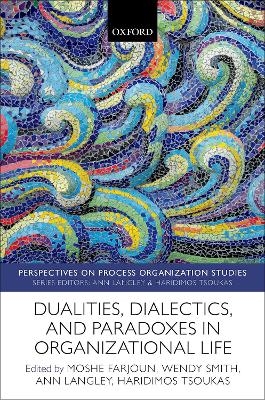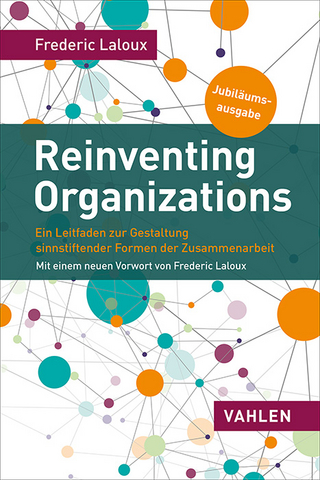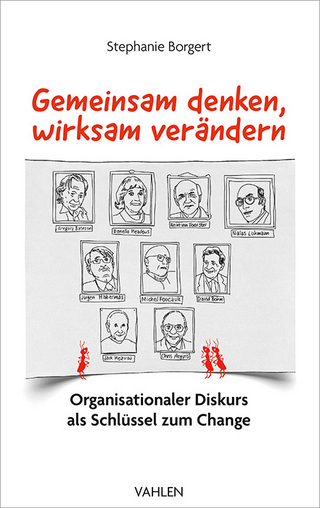
Dualities, Dialectics, and Paradoxes in Organizational Life
Oxford University Press (Verlag)
978-0-19-882743-6 (ISBN)
Contradictions permeate and propel organizational life - including tensions between reaching globally while focusing locally; competing while also cooperating; performing reliably while experimenting, taking risks, and learning; or granting autonomy while constraining freedom. These tensions give organizational members pause, but also spur them to take action; they may be necessary for preserving the social order, but are also required to transform it.
Drawing on the Eighth International Symposium on Process Organization Studies, Dualities, Dialectics, and Paradoxes in Organizational Life examines how contradictions fuel emergent, dynamic systems and stimulate novelty, adaption, and transformations. It uses conceptual and empirical studies to offer insight into how process theorizing advances understanding of organizational contradictions; to shed light on how dialectics, paradoxes, and dualities fuel persistence and transformation; and to explore the convergence and divergence of dialectics, paradox, and dualities. Taken together, it offers key insights to inform persistent, contradictory dynamics in organizations and organizational studies.
Moshe Farjoun is a Professor of Strategy and Organization at the Schulich School of Business, York University and is currently a visiting Research Fellow at the Judge School of Business, Cambridge University. Moshe received his Ph.D. from the Kellogg School of Management, Northwestern University. His research is mainly conceptual and historical and focuses on strategy, organization and adaptation in novel, complex and dynamic contexts as manifest in processes such as organizational learning, discovery, strategy making, managerial cognition, and institutional and strategic change. His current projects explore themes such as the interplay of routine and non-routine, as well as stability and change, in and around organizations, coevolution and shaping, endogenous change and discontinuities and surprises, and draws on Pragmatism, Evolutionary Theory, and Dialectics Wendy K. Smith is Professor of Management at the Lerner College of Business and Economics at the University of Delaware, and Research Fellow of the Cambridge Centre for Social Innovation. Her research explores how leaders and their organizations manage strategic paradoxes. She has published articles on strategic paradoxes in journals such as the Academy of Management Review, Academy of Management Journal, Administrative Science Quarterly, Organization Science, and Harvard Business Review. Ann Langley is Professor of Management at HEC Montréal, Canada and holder of the Chair in strategic management in pluralistic settings. Her research focuses on strategic change, inter-professional collaboration and the practice of strategy in complex organizations. In 2013, she was co-guest editor with Clive Smallman, Haridimos Tsoukas and Andrew Van de Ven of a Special Research Forum of Academy of Management Journal on Process Studies of Change in Organizations and Management. She is also co-editor of the journal Strategic Organization, and coeditor with Haridimos Tsoukas of a book series Perspectives on Process Organization Studies published with Oxford University Press. She is Adjunct Professor at Université de Montréal, and University of Gothenburg. Haridimos Tsoukas holds the Columbia Ship Management Chair in Strategic Management at the Department of Business and Public Administration, University of Cyprus, Cyprus and is a Distinguished Research Environment Professor of Organization Studies at Warwick Business School, University of Warwick, UK. He obtained his PhD at the Manchester Business School (MBS), University of Manchester, and has worked at MBS, the University of Essex, the University of Strathclyde, and at the ALBA Graduate Business School, Greece. He is the co-founder and co-organizer of the International Symposium on Process Organization Studies (with Ann Langley). His research is informed by process philosophy, phenomenology, and neo-Aristotelian perspectives on reason and the social. His interests include: knowledge-based perspectives on organizations and management; organizational becoming; practical reason in management and policy studies; and meta-theoretical issues in organizational and management research.
1: Moshe Farjoun, Wendy Smith, Ann Langley, and Haridimos Tsoukas: Introduction: Dualities, dialectics, and paradoxes in organizational life
2: Miguel Pina Cunha and Stewart Clegg: Persistence in Paradox
3: Esther R. Maier: Creating production values in a dramatic television series: Bridging creative and financial imperatives through the dialectics of calculative practice
4: Frédéric Gilbert, Valérie Michaud, Kathleen Bentein, Carl-Ardy Dubois, and Jean-Luc Bédard: Unpacking the dynamics of paradoxes across levels: Cascading tensions and struggling professionals
5: Reflexivity in Buddhist Epistemology: Implications for Cooperative Cognition , John Dunne
6: Marianne W. Lewis: Vicious and virtuous cycles: Exploring LEGO from a paradox perspective
7: Jenni Myllykoski and Anniina Rantakari: Eternal today: The temporality paradox in strategy-making
8: Charles W. Nuckolls: Paradox and dialectic in cultural knowledge systems: From cosmological science to South Indian kinship
9: Paula Jarzabkowski, Rebecca Bednarek, and Jane K. Lê: Studying paradox as process and practice: Identifying and following moments of salience and latency
10: Nicolás J. B. Wiedemann, Leona Wiegmann, and Juergen Weber: Artifacts and the dynamics of truces in organizational routines
| Erscheinungsdatum | 28.08.2018 |
|---|---|
| Reihe/Serie | Perspectives on Process Organization Studies |
| Verlagsort | Oxford |
| Sprache | englisch |
| Maße | 163 x 242 mm |
| Gewicht | 538 g |
| Themenwelt | Wirtschaft ► Betriebswirtschaft / Management ► Planung / Organisation |
| Wirtschaft ► Betriebswirtschaft / Management ► Unternehmensführung / Management | |
| ISBN-10 | 0-19-882743-1 / 0198827431 |
| ISBN-13 | 978-0-19-882743-6 / 9780198827436 |
| Zustand | Neuware |
| Haben Sie eine Frage zum Produkt? |
aus dem Bereich


